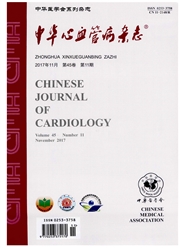

 中文摘要:
中文摘要:
目的通过筛查发热致Brugada样心电图(ECG)患者的基因突变,探讨其基因型与临床表型的关系,以及致恶性心律失常的风险。方法收集发热诱发的Brugada样ECG患者,筛除高血压病、冠心病、电解质异常、药物以及其他因素所致的复极化异常征象后,获取患者临床资料和血样标本,进行临床随访。利用DNA直接测序法,对候选基因SCN5A、SCN1b、SCN3b、GPD1L进行基因测序,寻找基因突变或单核苷酸多态性。通过与200例正常人群对照确定为基因突变或者多态性。结果共收集发热诱发典型Ⅰ型Brugada样ECG患者5例,体温恢复正常时Brugada样ECG均消失。随访3~5年无一例死于心原性猝死。基因筛查发现SCN5A基因1个突变和5个多态性:(1)1个突变,即SCN5A基因第17外显子第965密码子的第2893碱基C〉T错义突变,命名为精氨酸965半胱氨酸(R965C)。(2)5个SCN5A基因多态性,分别为A29A(c.87A〉G)、R1193Q(C.3578G〉A)、D1819D(c.5457T〉C)、exon11—24G〉A和exon23+4A〉G。结论我们首次发现国人发热致Brugada样ECG个体存在SCN5A基因突变R965C,该突变可能是发热致Brugada样ECG的遗传学基础。发热致Brugada样ECG个体发生恶性心律失常及心原性猝死风险尚需要进一步研究。
 英文摘要:
英文摘要:
Objective To explore the relationship between SCNSA, SCN1b, SCN3b and GPD1L genotypes and the risk of malignant arrhythmia in patients with Brugada electrocardiographic pattern induced by fever. Methods The clinical data and peripheral blood of patients with Brugada electrocardiographic pattern induced by fever were collected. Patients with depolarization abnormality associated with hypertension, coronary heart disease, drugs and other factors were excluded. The direct DNA sequencing was used to screen the mutation of candidate gene SCNSA, SCN1b, SCN3b and GPD1L. If gene variation was found, mutation or polymorphism was then determined by comparison with 200 control individuals. The relationship between genotype and phenotype as well as the risk of malignant arrhythmia were analyzed. Results Five eligible patients with fever-induced Brugada ECG pattern were included in this study. Type Ⅰ Brugada ECG was presented in all five patients in fibrile state and disappeared in normothermia. No sudden cardiac death (SCD) occurred and no ventricular arrhythmia was presented in Hoher monitor during the 3 to 5 years follow-up period. Six gene variants were found including a novel missense mutation of base C to T, named Arg965 Cys (R965C) , which located in 965 codon of the 17 exon in SCNSA, and five SCNSA polymorphisms including A29A ( e. 87A 〉 G), R1193Q( c. 3578G 〉 A ), D1819D( c. 5457T 〉 C), exonl 1 - 24G 〉 A, exon23 + 4A 〉 G. Conclusion SCNSA mutation is related to fever-induced Brugada ECG pattern. However, individuals with Brugada ECG pattern induced by fever bear low risk of malignant arrhythmia and SCD during fibrile state and follow up in this small patient cohort.
 同期刊论文项目
同期刊论文项目
 同项目期刊论文
同项目期刊论文
 期刊信息
期刊信息
